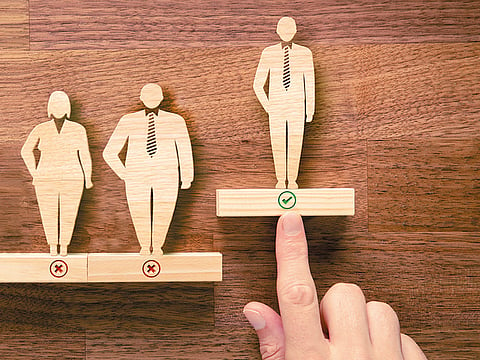Does being overweight affect hiring decisions?
Obese individuals have been targets of bias and stigma for years, affecting their opportunities in the workforce

When Ameila M., was finally called in for her job interview, she was confident that with her past work experience, she would land the job as a merchandiser.
Half way through the interview, the interviewer told her that she did not suit their criteria and was thus not qualified for the job — not professionally, but physically.
The 32-year-old Kenyan expat was told the company, which sells baby products, was looking for a much slender person to promote their products.
“It was that one look the interviewer gave me, and then decided that I didn’t suit their criteria because they wanted someone more presentable. My weight has never hindered me from doing my work. I’m on my feet six hours per day for six days per week,” says Amelia.
Amelia is not the only one being judged because of her weight. In many cases, even when overweight people are able to do the job competently, they commonly face discrimination either in the workplace or while looking for jobs in the UAE.
A survey showed that 76.4 per cent of respondents in the Middle East and North Africa believe employers make decisions based on a candidate’s physical appearance.
With the current obesity rate in the UAE — 66 per cent of men and 60 per cent of women being obese — according to the University of Washington’s Institute for Health Metrics and Evaluation, this report looks at how bias against overweight people is a reality in society and how employers generally overlook obese candidates in favour of attractive and fit looking people.
Overweight people can have a hard time finding work, and women are usually the most affected in the bias, a career coach told Gulf News.
Weight-based discrimination consistently affects every aspect of employment, starting from hiring to firing, including promotions and pay allocation, with evidence showing that employers generally have a preference for fit people.
Overweight and obese individuals have been targets of bias and stigma for years, affecting their opportunities in the workforce, experts said.
Zeta Yarwood, Executive Career Coach & NLP Life Coach, says appearance does affect the hiring process and it’s far too common for employers to make assumptions about an individual’s capabilities, attitude and personality based on their weight.
She says this has been due to a common phenomenon researchers call the ‘halo effect’.
“There is evidence to suggest that employers do have a preference for fit people in the hiring process worldwide. The halo effect is a cognitive bias whereby people assume a person possesses positive personality traits and superior capabilities if they are perceived as good looking or fit,” she said.
This also works in reverse, she explained. “If a person is physically unfit, they might be perceived to possess more negative traits such as laziness, lack of self-motivation and even incompetence. Evidence has shown obese people are perceived to be less capable leaders and less likely to be successful and productive.”
Gulf News tried to speak to a number of recruitment agencies in the UAE on the issue of weight-based discrimination but they refused to comment.
Women face bias the most
Yarwood says the bulk of research has shown that work-based biases tend to be against women most of the time.
Throughout the study of psychology, she added, it has been well-documented that women’s attractiveness “is based more on their physical appearance than a man’s”.
“A man’s attractiveness in very general terms is more skewed towards height and perceived wealth. So it is more likely that people will perceive an overweight woman as less attractive (and therefore less capable) than a man,” Yarwood explained.
According to the WHO, it defines overweight as a body mass index (BMI) equal to or greater than 25 kg/m² and obesity as a BMI equal to or greater than 30 kg/m².
While a slight increase in weight shouldn’t hurt an applicant’s prospects, a study in the scientific journal Plos One, showed that it can, especially if it is a woman. The study found that the women with heavier faces were rated lower than both the original faces and the heavier male faces.
Yarwood has pointed out that generally, overweight people will find it difficult to get into careers that are customer facing or involve public interaction. For example, sales, particularly in fashion and beauty retail, media, customer service.
“Employers will presume that if they find this person unattractive and subsequently incompetent then so will their customers”,” she said, noting that people make all sorts of assumptions about people based on their appearance and customers are of no exception.
However some jobs do require fit people, said Yarwood. For example joining the police force or being a firefighter requires someone who is fit, but for jobs where physical fitness is not going to impact their ability to their job, then there should be no discrimination.”
Sign up for the Daily Briefing
Get the latest news and updates straight to your inbox



